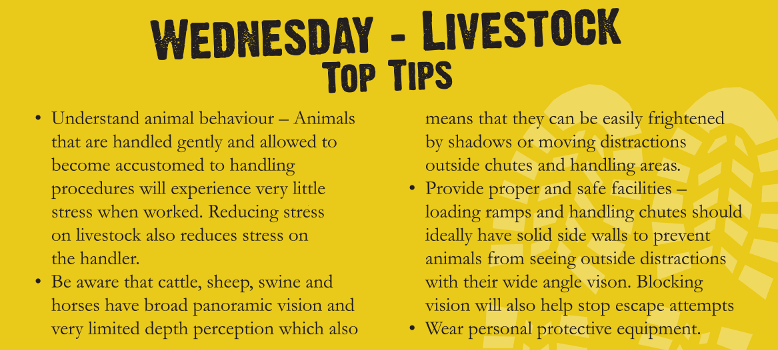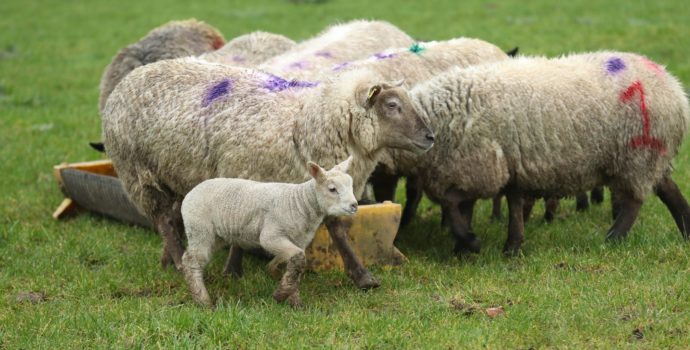Take Stock of Livestock on Day Three of Farm Safety Week

Against the background of the Royal Association of British Dairy Farmers (RABDF) annual Livestock Event, opening today at Birmingham’s NEC, Day Three of Farm Safety Week casts a spotlight on livestock and, in particular, crush injuries.
Farm Safety Week aims to cut the toll of accidents which continue to give agriculture the poorest record of any occupation in the Ireland and the UK. The awareness week, which runs July 4th to 8th offers five days of themed practical farm safety advice and guidance to farmers and urges farmers to consider ‘Who Would Fill Your Boots?’ if you had a farm accident.
Handling cattle always involves risks, the risk of being hurt physically by an animal that is frightened or has been startled and the risk of being hurt due to the misuse of equipment or equipment that is poorly maintained.
Although most animal incidents are not fatal, many men, women and children are needlessly injured every year due to a lack of safety awareness. Broken bones, crushed and mashed limbs, work absences and unnecessary medical expenses are some of the results of livestock-related incidents so, today, the Farm Safety Week team is challenging farmers to think about improving livestock handling systems and making them safer and more efficient.
Speaking at the RABDF panel discussion on the opening day of the Livestock Event at the NEC, Richard Kennedy, IFA Deputy President said, “Over the course of this week, we have five days, five themes and five countries with one very clear question: Have you thought about ‘Who Would Fill Your Boots?’ if you were to have a farm accident. The initiative is supported by the Farm Safety Foundation, Farm Safety Partnerships, the Health & Safety Executive, Health & Safety Executive for Northern Ireland and Health & Safety Authority, Ireland and aims to educate and inspire a drive to improve agriculture’s poor safety record.”
Richard Kennedy adds: “This Farm Safety Week we are calling for farmers to safer and smarter around livestock. People tend to give animals human qualities and forget that animals quickly revert to primal reflex actions when they are threatened or under stress. Animals will fiercely defend their food, shelter, territory and young. When frightened or in pain, animals may react in ways that threaten their, and our safety.”
“Facilities, too, can play a major role in preventing incidents. Good facilities provide a means of controlling animals while allowing easy access for routine chores – all in a safe environment. Often we don’t make adjustments or modify our equipment to make it safer because we are in a hurry or for economic reasons we feel that we should “make do” with what we’ve got. There needs to be an element of common sense and safety involved in these decisions – “because I’m in a hurry” is not a good enough reason for poor maintenance of equipment and facilities. Safe handling equipment is more of an investment than an expensive luxury. Ask yourself ‘Who Would Fill Your Boots?’ if something serious were to happen to you while handling livestock and don’t rely on luck – one day it could run out.”
Dominic Leonard’s story*
Dominic farms with his wife Ali and three children in Durrow, Co. Laois. Not a typical farmer, Dominic was brought up in South Dublin, educated in boarding school in Yorkshire, and had absolutely no experience of or interest in farming as a career. He had been working in a cafe in Dublin when he unexpectedly received a call from his uncle asking him if he would like to take over his 250 acre farm.
Dominic had only ever visited the farm a few times during his childhood, but after a visit to Castlewood in Durrow, he was persuaded to take over the farm.
It was March 4th, calving time, and like all farmers, Dominic was up and out early to check on the cows that were calving. To this day no-one knows exactly what happened however Ali and four year old Sorcha came down to the kitchen for breakfast, at around 7.00am and found Dominic unconscious on the floor, lying in a pool of blood, with a fractured skull, crushed ribs and severe head injuries.
Dominic was rushed to hospital where he remained in a coma for six weeks. The only clue as to what had happened was the open kitchen door and a trail of blood leading out to the yard…
Tagging of calves is a legal requirement and has to be done within a specified time after birth. It is whilst he was busy tagging a calf that it is believed a cow charged him, throwing him across the pen and his head against a wall. Somehow, despite his horrific injuries, the bloodstains hinted that he had managed to drag himself 300 metres back across the yard – before he collapsed unconscious on the kitchen floor, unable to raise the alarm.
Today Dominic still has no recollection of what really happened on that fateful day. Like many farmers who keep cattle, Dominic would have been well aware of the dangers of livestock, but when you are working alone the dangers are all too real. Despite the devastating consequences of that day, Dominic considers herself fortunate and, as he tends his prize Angus heifers, he is conscious that it was one of these animals that almost ended his life. But he will never know which one.




